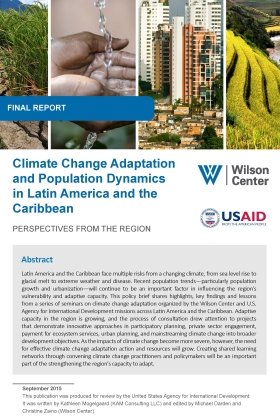Climate Change Adaptation and Population Dynamics in Latin America and the Caribbean - Perspectives from the Region




Latin America and the Caribbean face multiple risks from a changing climate, from sea level rise to glacial melt to extreme weather and disease. Recent population trends—particularly population growth and urbanization—will continue to be an important factor in influencing the region’s vulnerability and adaptive capacity. This policy brief shares highlights, key findings and lessons from a series of seminars on climate change adaptation organized by the Wilson Center and U.S. Agency for International Development missions across Latin America and the Caribbean. Adaptive capacity in the region is growing, and the process of consultation drew attention to projects that demonstrate innovative approaches in participatory planning, private sector engagement, payment for ecosystem services, urban planning, and mainstreaming climate change into broader development objectives. As the impacts of climate change become more severe, however, the need for effective climate change adaptation action and resources will grow. Creating shared learning networks through convening climate change practitioners and policymakers will be an important part of the strengthening the region’s capacity to adapt.
Author


Latin America Program
The Wilson Center’s prestigious Latin America Program provides non-partisan expertise to a broad community of decision makers in the United States and Latin America on critical policy issues facing the Hemisphere. The Program provides insightful and actionable research for policymakers, private sector leaders, journalists, and public intellectuals in the United States and Latin America. To bridge the gap between scholarship and policy action, it fosters new inquiry, sponsors high-level public and private meetings among multiple stakeholders, and explores policy options to improve outcomes for citizens throughout the Americas. Drawing on the Wilson Center’s strength as the nation’s key non-partisan policy forum, the Program serves as a trusted source of analysis and a vital point of contact between the worlds of scholarship and action. Read more


Brazil Institute
The Brazil Institute—the only country-specific policy institution focused on Brazil in Washington—aims to deepen understanding of Brazil’s complex landscape and strengthen relations between Brazilian and US institutions across all sectors. Read more


Environmental Change and Security Program
The Environmental Change and Security Program (ECSP) explores the connections between environmental change, health, and population dynamics and their links to conflict, human insecurity, and foreign policy. Read more

Explore More
Browse Insights & Analysis
Climate Change Adaptation in Latin America


